Can Europe become the hotspot for talent?
With an ageing population, traditional education systems and rapidly advancing technology, the skills gap has evolved into a systemic threat.
“The situation of skills shortages has evolved over the past decades”, said Delphine Rudelli, Director General of CEEMET.
The issue has shifted from a straightforward skills gap to a more complex crisis of both labour and skill shortages. What was once a workforce issue has become a pressing challenge to overall European competitiveness.
Delphine Rudelli, Director General of CEEMET
This double crisis – too few workers and too few of them equipped for an increasingly digitised and technology-driven manufacturing sector – was highlighted across many discussions during InnoHive 2025.
“More than 75% of EU companies report difficulties in finding workers with the right skills — particularly in sectors critical to the green and digital transitions”, said Oscar Pasquali, CEO of Generation Italy.
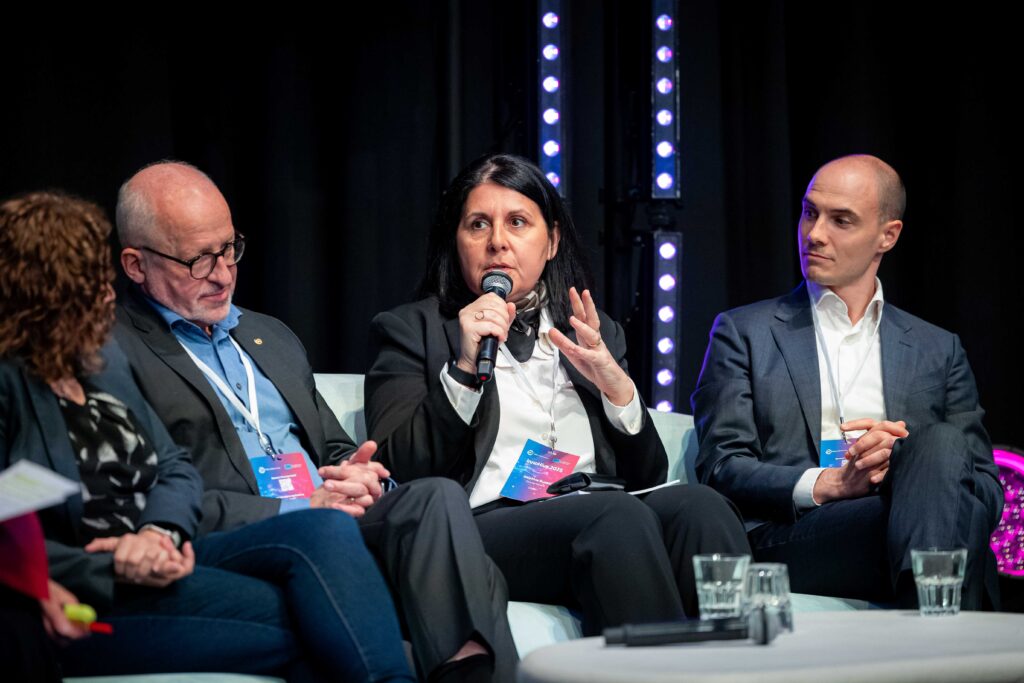
Audrey Stolze, Johan Stahre, Delphine Rudelli and Oscar Pasquali at InnoHive 2025. Photo credit (c) Xavier Lejeune
Finding talent with the right mix of technical, digital and soft skills is a challenge. In a conversation with SKF, they shared how launching the Future Factory initiative — focused on Industry 4.0 tools like — quickly revealed the limits of traditional project-based staffing. Rapid ramp-ups strained teams and attempts to adopt new delivery models revealed another constraint: legacy financial models that couldn’t keep up with the pace of digital transformation.
This is just one example of the broader mismatch. “Over 20 million people in the EU are unemployed or inactive but willing to work, especially among youth, women and migrants.” To address this, “bootcamps and micro-credentials can help turn this paradox into an opportunity by bridging the gap between labour market demand and untapped talent”, said Pasquali.
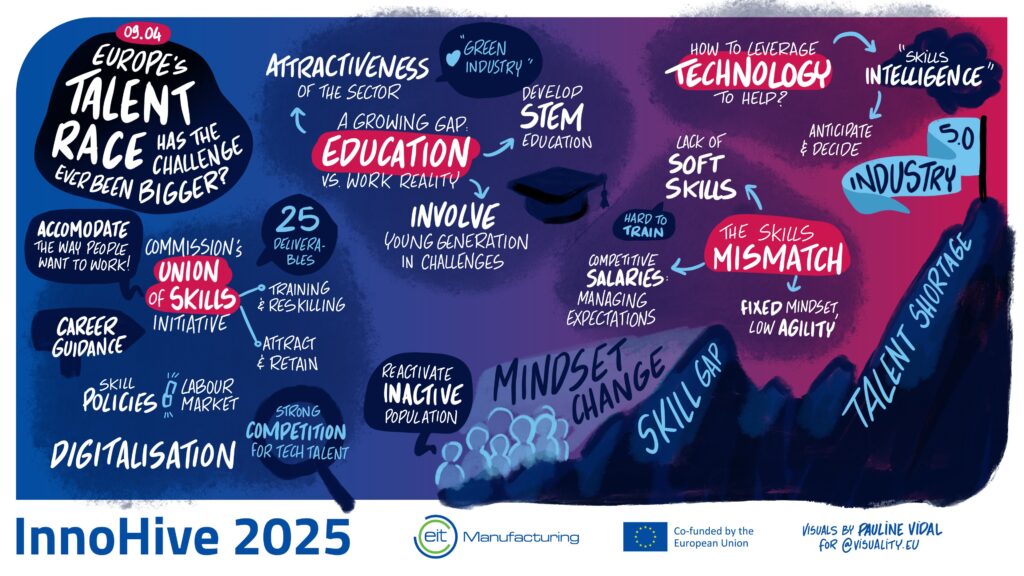
Visuals by Pauline Vidal
A system in need of reform
Several voices at InnoHive 2025 urged for Europe to reimagine how it prepares its workforce. Professor Johan Stahre of Chalmers University of Technology described the European Commission’s Union of Skills initiative, which looks to ensure that education and training systems are equipped to meet the rapidly evolving demands of industry and society, as a “turning point”. It aims to unify reskilling and upskilling efforts across borders and provide a highly skilled and adaptable workforce. “But policy alone won’t solve the crisis”, he added.
We can’t wait until university. If we don’t engage young people at school, it’s already too late.
Diana Filip, Deputy CEO and Chief Development Officer at JA Europe, made a case for early intervention
Her organisation is expanding its Tech Talent Initiative with the goal of reaching 100,000 students. The key, she argued, is to reframe manufacturing as exciting, high-tech and impactful – particularly for younger generations who are increasingly driven by a sense of purpose for what they do and sustainability.
Magnus Wahlgård, Delivery Manager at SKF, shared that traditional HR frameworks are designed for conventional roles. They need to be adapted to support talent. In SKF’s case, their strong industrial brand lacked visibility within digital talent circles. To address this, they adopted a Build-Operate-Transfer (BOT) model, partnering with a specialist vendor to build a dedicated digital team, operate it within SKF’s environment and transfer it in-house once capabilities were established. As a result, the team grew from 30 core members to over 90 members within 18 months.
Academia must play its part and it must adapt and work with industry.
Supporting people in developing the skills needed to navigate a fast-changing labour market is a challenge too great to be tackled by any single actor alone. Public, private and philanthropic sectors must align resources, capabilities and incentives to identify, test and scale effective solutions.
Oscar Pasquali, CEO of Generation Italy
One of the clearest takeaways was that theory alone won’t equip the next generation of workers. Real-world learning must become the norm. Audrey Stolze, Director of Education and Training at EIT Manufacturing, championed experiential education models like the Teaching Factories Competition, which pairs student teams with actual industrial challenges. “Competence isn’t built just through lectures”, Stolze said. “It’s built through action, reflection and collaboration.”
Mirza Pasic, Associate Professor and Vice Dean for International Cooperation at the University of Sarajevo, added that universities must become more agile and responsive.
Jobs aren’t disappearing – they are just evolving. Curricula must be continuously updated to reflect that reality.
Mirza Pasic, Associate Professor and Vice Dean for International Cooperation at the University of Sarajevo
He also highlighted the importance of cross-border cooperation to share best practices and accelerate innovation.
These insights converged in a call for structured collaboration between academia and industry. As Liga Baltina, Manager at Fondazione Giacomo Brodolini, noted, “Companies need to be at the table from day one.” This includes co-designing curricula, investing in faculty development and using tools like AI-driven skills intelligence to predict future workforce needs.
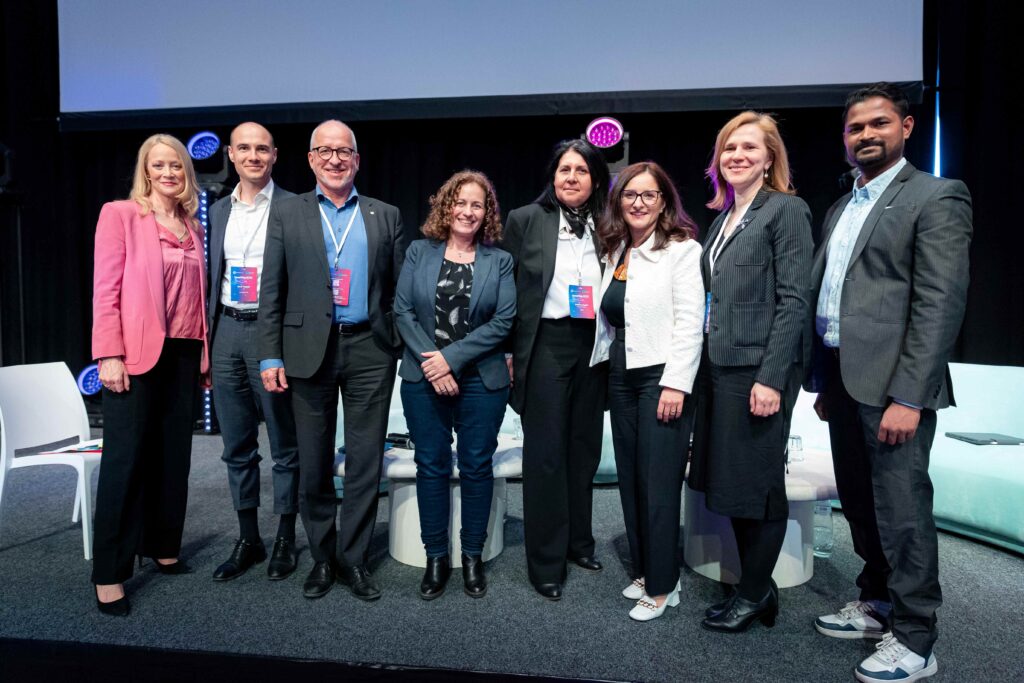
Moderator Karin Helmstaedt, Oscar Pasquali, Johan Stahre, Audrey Stolze, Delphine Rudelli, Diana Filip, Liga Baltina and Kay Nag at InnoHive 2025. Photo credit (c) Xavier Lejeune
Untapped potential
Inclusion was also a critical theme.
Only 3% of VC money in Europe goes to all-female founding teams.
Nina Wöss, Managing Partner at Fund F, starkly reminded the audience
For Mileva Gojkovich, Girls Go STEM project ambassador, and Selen Şenal, CEO and Founder of Algbio, the solution lies in connecting young women with meaningful tech experiences early on and then sustaining that support throughout their careers. Programmes like EIT Manufacturing’s RIS LEADERS Competition and the Women TechEU project are helping to close this gap by combining mentorship, visibility and strategic funding.
When girls care about the problem they’re solving, they take ownership. That’s when they become leaders.
Mileva Gojkovich, Girls Go STEM ambassador, emphasised the power of emotional relevance in tech education
Şenal agreed, adding: “These support programmes don’t just offer funding, they give women mentorship, visibility and a route into international markets.” Importantly, inclusion was not framed as a matter of fairness, but of economic logic.
Diverse leadership drives better performance.
If women comprise over half the talent pool, then failing to support their rise is not just a gender issue – it’s a strategic failure.
Claudia La Via, Moderator
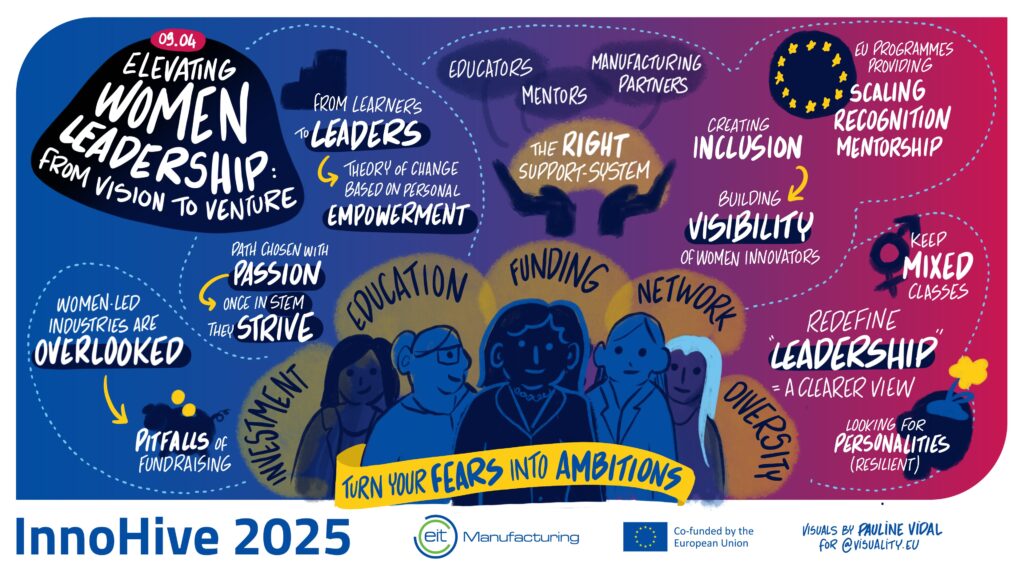
Visuals by Pauline Vidal
Niki Kousi, Managing Director at EIT Manufacturing, added how ecosystems can level the playing field and address this failure. “We don’t just fund women innovators – we embed them in real industrial networks. We connect them with mentors, decision-makers and pilot sites.” She pointed to success stories from regional competitions, where women-led deep tech startups emerged not just as participants, but as winners and she stressed that women thrive when given both structure and autonomy.
It’s not enough to tell women ‘you belong.’ We must create ecosystems where they can lead without asking permission.
Niki Kousi, Managing Director at EIT Manufacturing
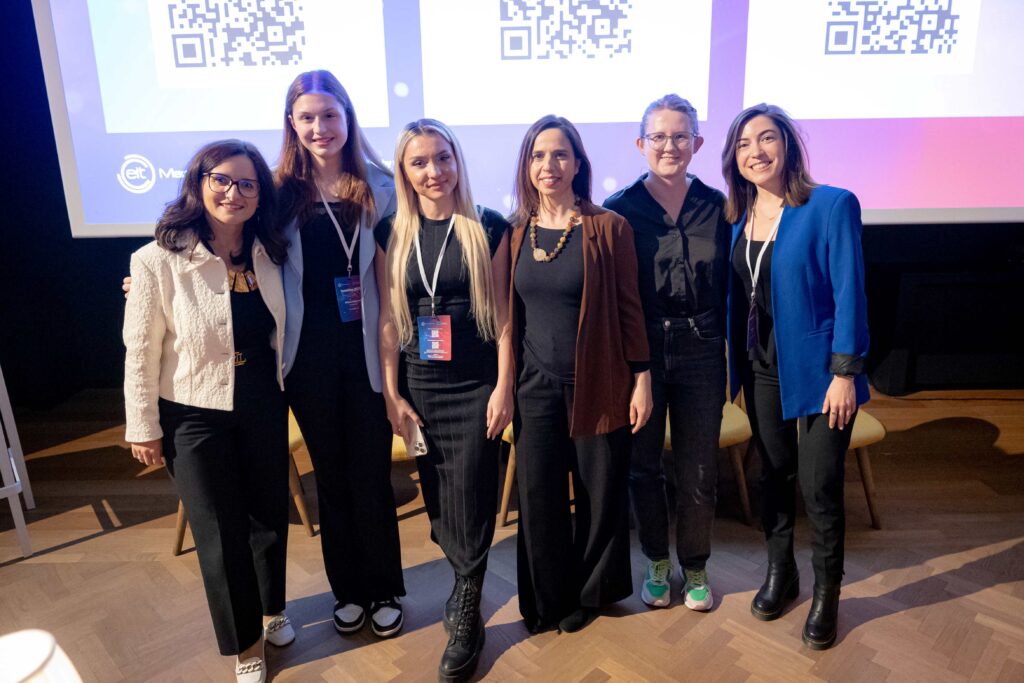
Diana Filip, Mileva Gojkovich, Selen Şenal, Claudia La Via, Nina Wöss and Niki Kousi at InnoHive 2025. Photo credit (c) Xavier Lejeune
Global pressure
There is a further geopolitical dimension to Europe’s skill crisis, as became apparent during the discussions. As China accelerates its dominance in advanced manufacturing and AI and the United States invests heavily in industrial innovation through initiatives like the CHIPS Act, emerging economies such as India and Vietnam are mobilising vast, tech-savvy workforces to compete on scale, speed and cost. Europe, by contrast, is grappling with fragmented systems and slow talent development.
With recent cuts in research funding by US President Trump and changes to the H-1B visa programme, Europe has an opportunity to become the centre of innovation. ‘Choose Europe’ aims to advance research in the EU and make Europe a magnet for talent.
David Timis, Global Communications and Public Affairs Manager at Generation, echoed this competitive pressure: “Waiting for governments, employers, or universities to provide reskilling opportunities will leave many individuals behind. Instead, a proactive attitude is crucial.” Without bold, coordinated action, Europe risks becoming a follower in the global industrial race.
From strategy to action
The skills gap is not just a challenge but a call to action. The tools to address it exist – bootcamps, AI forecasting, school programmes, academic entrepreneurship – but they need to be connected through coherent strategies, shared responsibility and sustained investment.
Europe has talent. What it needs now is the vision and the will to unleash it. InnoHive 2025 offered a clear blueprint to do just that.

